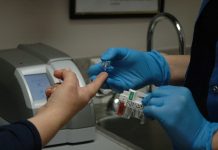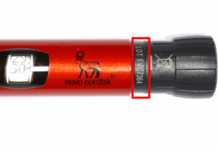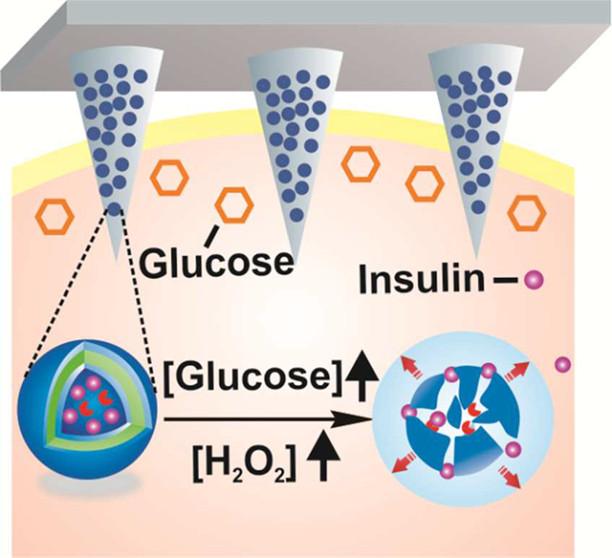A Gardenia fruit extract traditionally used in Chinese medicine to treat the symptoms of type 2 diabetes does indeed contain a chemical that reverses some of the pancreatic dysfunctions that underlie the disease, researchers report in the June 7, 2006, Cell Metabolism. The chemical therefore represents a useful starting point for new diabetes therapies, they said.
Such a drug could offer a big advance, the group added, as no currently available therapy for diabetes actually targets the underlying causes of disease in insulin-producing pancreatic beta cells. Insulin controls blood levels of glucose, the body's main energy source. In those with diabetes, insulin deficiency or insulin resistance causes blood sugar concentrations to rise.
The team discovered that Gardenia extract contains the chemical "genipin." Previously known for its ability to cross-link proteins, they now find that the chemical also blocks the function of the enzyme called uncoupling protein 2 (UCP2) through another mechanism. In both animals and humans, high concentrations of UCP2 appear to inhibit insulin secretion from the pancreas and increase the risk of type 2 diabetes.
"We think the increase in UCP2 activity is an important component of the pathogenesis of diabetes," said Bradford Lowell of Beth Israel Deaconess Medical Center and Harvard Medical School. "Our goal therefore was to discover a UCP2 inhibitor capable of working in intact cells, as such an inhibitor could theoretically represent a lead compound for agents aimed at improving beta cell function in type 2 diabetes."
Study coauthor Chen-Yu Zhang's familiarity with traditional Chinese medicine led the team to consider the extract of Gardenia jasminoides Ellis fruits. Pancreas cells taken from normal mice secreted insulin when treated with the extract, they found, whereas the cells of mice lacking UCP2 did not. The results suggested that the extract worked through its effects on the UCP2 enzyme.
"When I first saw the results, I was in disbelief," Lowell said. "I didn't think we could ever be that lucky." However, blinded repetition of the initial experiments confirmed the results every time, he said.
Through a series of chemical analyses, the researchers then zeroed in on genipin as the active compound. Genipin, like the extract, stimulated insulin secretion in control but not UCP2-deficient pancreas cells.
They further found that acute addition of genipin to isolated pancreatic tissue reversed high glucose- and obesity-induced dysfunction of insulin-producing beta cells. A derivative of genipin that lacked the chemical's cross-linking activity continued to inhibit UCP2, they reported.
That's a good sign for the therapeutic potential of genipin-related compounds, according to Lowell, as such indiscriminate cross-linking would likely have adverse effects. However, further work will need to examine whether inhibition of UCP2 itself might also have some negative consequences.
In addition to the possibility of new drugs, the findings might also prove a boon to the use of Gardenia extract itself for the treatment of disease, particularly in eastern Asia, Zhang said.
Irrespective of genipin's potential for clinical applications, its benefits within the scientific community are already clear, Lowell added.
Continue Reading Below ↓↓↓
"Genipin represents an extremely useful investigational tool for studying a number of aspects of UCP2 biology," Lowell added. UCP2 plays a role in the process by which food is converted into energy storage molecules by cellular powerhouses called mitochondria in cells throughout the body.
The researchers include Chen-Yu Zhang of Beth Israel Deaconess Medical Center and Harvard Medical School in Boston, MA and Nanjing University in Nanjing, China; Laura E. Parton, Chian Ping Ye, and Bradford B. Lowell of Beth Israel Deaconess Medical Center and Harvard Medical School in Boston, MA; Stefan Krauss of Beth Israel Deaconess Medical Center, Harvard Medical School, and Merck Research Laboratories (present address) in Boston , MA; Ruichao Shen, Cheng-Ting Lin, and John A. Porco, Jr. of Boston University in Boston, MA.
This work was supported by grants from the National Institutes of Health (to B.B.L.) and the American Diabetes Association (Junior Faculty Award), National Natural Science Foundation of China (Outstanding Young Scientist Award 30225037), IRP0430, and National Basic Research Foundation of China (973 Program, 2004CB518603) (to C.-Y.Z).
Zhang et al.: "Genipin inhibits UCP2-mediated proton leak and acutely reverses obesity- and high glucose-induced b cell dysfunction in isolated pancreatic islets." Publishing in Cell Metabolism 3, 417�427, June 2006 DOI 10.1016/j.cmet.2006.04.010
Source: Cell Press











